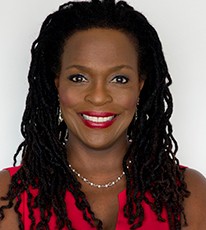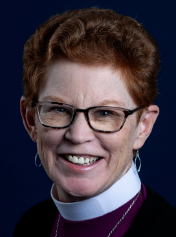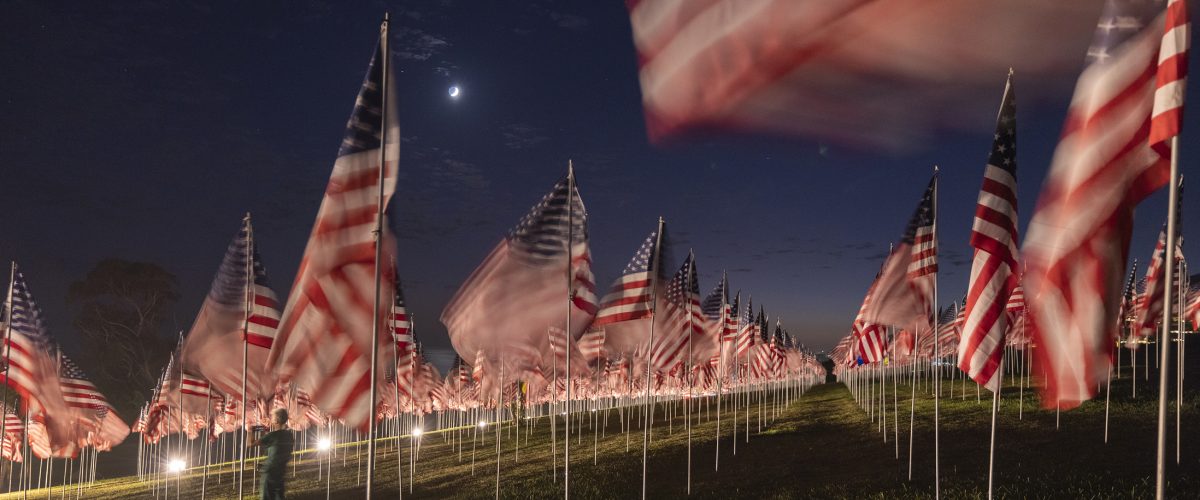Among social justice advocates, reaction to Donald Trump’s election victory included sheer exhaustion, anger and renewed determination to continue the struggle for religious freedom, racial justice, LGBTQ rights and compassionate immigration reform.
For Jacqueline Lewis, it was pretty much all of the above.

Jacqui Lewis
“I am gob smacked. Sad. Devastated. Angry. Disappointed. I did not have in mind we would lose,” Lewis, senior minister for public theology and transformation at Middle Collegiate Church in New York City, said in a Nov. 6 email to the congregation and its supporters.
“This feels like the end. Like we lost. And it IS the end of something. We DID lose this election. Because there was power in the fear and anger that brought us here, maybe more than we thought.”
But there is hope in the fact that new beginnings emerge from loss, and that the movement against bigotry, fear and hatred will continue with the power of community and God, Lewis said. “Today we grieve what we lost. We mourn the dead dream. We own the sense of betrayal. We rage at the powerful grip that MAGA has on our nation. And we pray. And we weep. And we shake our fists.”
Jemar Tisby confessed Nov. 6 to being flat-out exhausted after all the traveling, writing and speaking out against the dreaded possibility of a Trump victory.
“It’s why I haven’t been home for more than three days at a stretch for the last three months,” he wrote in his “Footnotes by Jemar Tisby” Substack.

Jemar Tisby
“It’s why I’ve been writing here on my Substack at a furious pace. It’s why I’ve been constantly telling people about why we need the spirit of justice,” said Tisby, a racial justice activist, history professor at Simmons College of Kentucky and author of The Spirit of Justice: True Stories of Faith, Race, and Resistance.
Tisby said his weariness deepened when memories of the first Trump presidency flooded his mind:
- “Major policy decisions made with a social media post.
- “Massive national news breaking on a Friday night as the week winds down.
- “The barrage of bigotry spewing from his lips and those of his supporters every single day.
- “The brazen rollbacks of basic civil rights. The most vile and inhumane words, ideas and actions done in the name of Christ.”
Anticipating widespread anger and grief among its partners, the interfaith advocacy group Texas Impact hosted “Post-Election Sanctuary: A Time to Reflect and Re-Group” Nov. 6. The virtual event provided a forum for sharing sadness, outrage and the resolve to continue advocacy. The gathering also featured livestreamed prayers and comments by Texas faith leaders and Texas Impact staff.
 “There are those who are rejoicing and those who are weeping today as we look into the future,” said Sue Briner, bishop of the Southwestern Texas Synod of the Evangelical Lutheran Church in America.
“There are those who are rejoicing and those who are weeping today as we look into the future,” said Sue Briner, bishop of the Southwestern Texas Synod of the Evangelical Lutheran Church in America.
“But as people of faith, we need to be reminded God is still God and we are not, thanks be to God. We are still called to love one another, even in the midst of disagreements. We are still called to be compassionate, knowing that everyone has a story that we may know little about.”
And people of faith are called to be “vigilant guardians of truth, refusing to perpetuate lies or half-truths that further corrode the fabric of our society. We are called to denounce violence of any kind, whether in speech or in action. And we are still called to build bridges of understanding rather than erect walls of intolerance.”
The Alliance of Baptists acknowledged the “disbelief and fear” many felt in the wake of the election, but added the injustices of the world are the same now as they were before Nov. 5. Therefore, it’s vital to continue in the work of anti-racism and of calling out white supremacy.
“We remain committed to the work of radical inclusion and proclaiming God’s loving justice for the world: For Gaza. For women. For the LGBTQ community. For immigrants. For those outcast and marginalized by our systems,” the organization said. “We must keep at it, Alliance family. The work continues.”

Paul Raushenbush
Interfaith Alliance promised it will do everything in its power to deter Project 2025, including uniting and rallying diverse religious groups, building local and state alliances, partnering with allies in government and continuing to educate Americans about Christian nationalism.
“To defeat Project 2025’s implementation, we must grow and marshal more resources to equip more mainstream religious voices against Christian nationalism,” President Paul Raushenbush said. “There is a mass movement of Americans who will never give up the struggle for a more just, kind, equitable and free country.”
Trump’s election victory signals a coming battle for religious freedom and against implementation of Project 2025, agreed Rachel Laser, CEO of Americans United for Separation of Church and State.
“We are deeply dismayed but undeterred. Christian nationalism has seized power in a way it could not on Jan. 6, 2021, and we have a serious fight ahead,” she said. “Trump and his Christian nationalist inner circle will try to abuse their power to privilege a chosen few at the expense of our most marginalized communities.”

Rachel Laser
Laser affirmed the fear many Americans feel but promised Americans United is launching a movement that “will be a bulwark” against Christian nationalism. “We’re organizing and fighting in every community, county, city and state — everywhere. Church-state separation is the cure for white Christian nationalism, and it’s also the foundation of our democracy.”
The National Immigration Forum announced the election outcome will not deter its mission to uphold the dignity of immigrants and the communities that depend on them, said Jenny Murray, CEO of the Washington, D.C.-based organization.
She also urged President-elect Trump to work with Congress on reforms to the nation’s immigration system that safeguard immigrants and boosts the U.S. economy.
“We appeal to the incoming administration and Congress to listen to the strong majority of Americans, including Republican voters, who want Republicans and Democrats to work together on border and immigration solutions,” she said. “More than 75% of voters, including seven in 10 self-identified Republicans, support such solutions.”
Murray also appealed to Trump not to enact policies that generate uncertainty among immigrants and their communities. “Now that the election is over, we urge the president-elect to reconsider unworkable and costly policies he touted in the campaign, particularly mass deportation, which would separate families and damage our communities and economy.”
Catholics for Choice decried the decades of support Catholic men and bishops have demonstrated for Christian nationalism.
“They are all too often the architects (of) attacks on abortion rights, LGBTQ inclusion, and gender equality. We fear that with the results of this election, those rightwing forces will become more emboldened to advance their anti-woman, anti-LGBTQ agenda.”
And while early exit polls showed Catholics supporting Trump by a double-digit margin, the organization took comfort in the passage of seven out of 10 abortion-rights amendments across the nation. “As we learn more about the election results and what motivated voters, the fact remains that pro-choice Catholics are the majority, regardless of the bishops’ views on the matter.”
Related articles:
Save this column and don’t say we didn’t warn you | Opinion by Mark Wingfield
Christians and the fight for justice after Trump’s return | Opinion by Rosaly Guzman
Dear Democrats, you neglected the poor | Opinion by David Bumgardner


